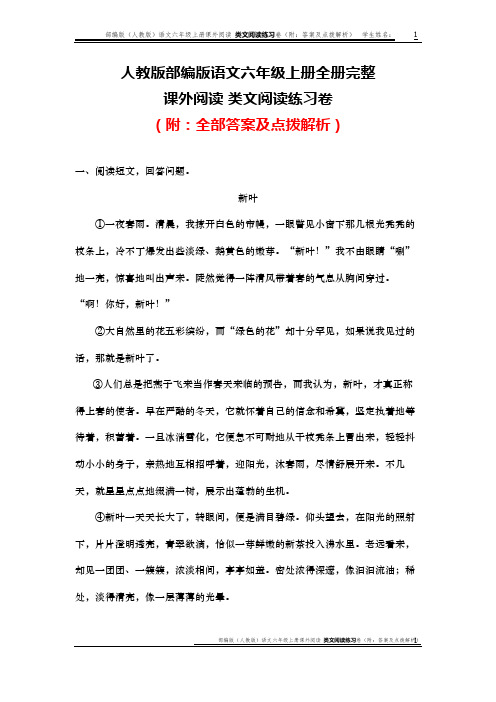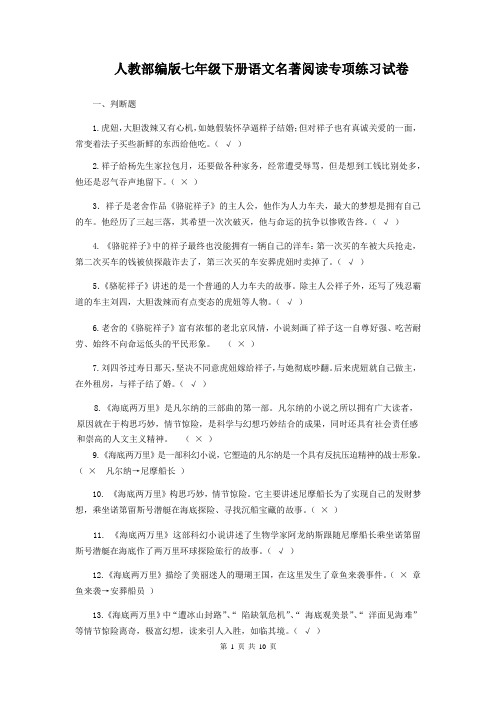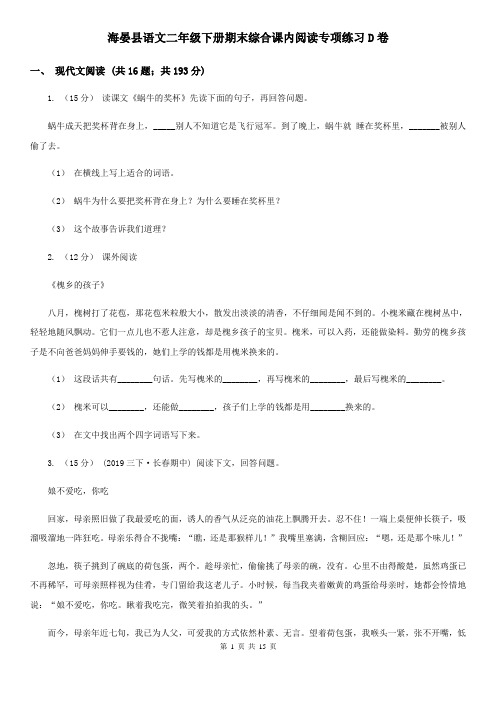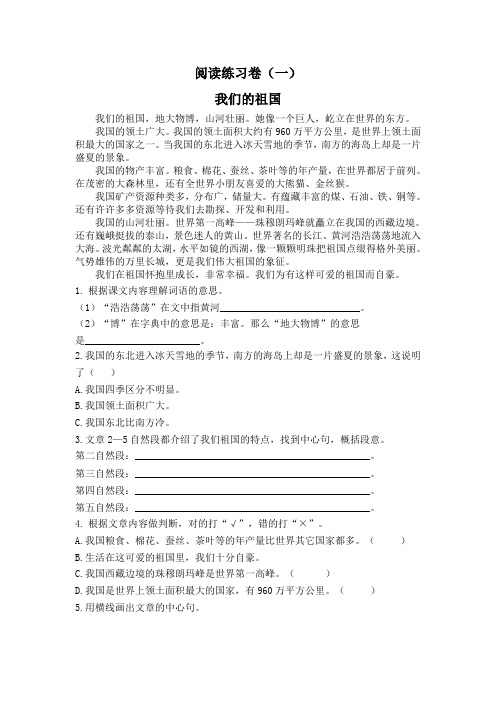阅读练习卷
期末现代文阅读真题练习卷(二)(试卷)部编版语文三年级上册

期末现代文阅读真题练习卷(二)-小学语文三年级上册部编版一.现代文阅读(共10小题)1.(2022秋•龙华区期中)阅读下列短文,回答问题。
不听话的小树在山城上有两棵树,一棵是大树,一棵是小树。
一天,七星瓢虫来到小树旁边说:“小树,我要产卵了,我能不能在你身上产卵?”小树连忙说:“不行!不行!你长得太难看了,我才不让你在我身上产卵。
”七星瓢虫无可奈何地飞到了大树身上。
过了一会儿蝴蝶飞来了。
蝴蝶娇滴滴地说:“小树,我能不能在你身上产卵?”读到这里,蝴蝶想在小树身上产卵,我预测小树会说: 我的依据是: 小树说:“可以!可以!”大树连忙说:“小树,你可别让它在你身上产卵,它的卵会变成毛毛虫把你的树叶全吃光。
”小树说:“我才不信呢!美丽的东西一定会生下好东西。
”蝴蝶听了高兴地飞到了小树身上。
过了几天,七星瓢虫和蝴蝶的幼虫都生下来了。
七星瓢虫让孩子们把大树身上的虫子都吃光了,大树长得又高又壮。
但毛毛虫把小树身上的叶子都吃光了。
啄木鸟飞过,见小树不舒服,关心地问:“小树,你生病了,我帮你治治吧?”小树不在意地说:“不用,毛毛虫长大以后会变成蝴蝶飞走的。
”我预测小树的结局是: 我的依据是: 又过了几天,在一个风雨交加的夜晚,天空中电闪雷鸣,一道白亮亮的闪电把小树劈倒了,大树望着固执的小树流下了悲伤的眼泪。
(1)请你对故事进行合理预测,并把预测的结果和依据写在文章中的横线上。
(2)文中 在大树上产卵了,结果大树长得 ; 在小树上产卵了,结果小树 。
我知道了对于树来说, 是益虫, 是害虫。
(3)根据短文内容判断下列说法的对错,正确的打“√”,错误的打“×”。
①小树不让七星瓢虫在它身上产卵,因为小树嫌七星瓢虫长得丑。
②大树又高又壮,是因为毛毛虫帮助它吃了虫子。
③啄木鸟看到小树身体有点不舒服,想帮它治病。
(4)佳佳说他读了这个故事明白了不能固执己见,要善于听从别人的建议。
通过这个故事你还明白了什么道理?试着写一写吧。
部编版(人教版)语文六年级上册课外阅读 类文阅读练习卷(附:答案及点拨解析)

人教版部编版语文六年级上册全册完整课外阅读类文阅读练习卷(附:全部答案及点拨解析)一、阅读短文,回答问题。
新叶①一夜春雨。
清晨,我撩开白色的帘幔,一眼瞥见小窗下那几根光秃秃的枝条上,冷不丁爆发出些淡绿、鹅黄色的嫩芽。
“新叶!”我不由眼睛“唰”地一亮,惊喜地叫出声来。
陡然觉得一阵清风带着春的气息从胸间穿过。
“啊!你好,新叶!”②大自然里的花五彩缤纷,而“绿色的花”却十分罕见,如果说我见过的话,那就是新叶了。
③人们总是把燕子飞来当作春天来临的预告,而我认为,新叶,才真正称得上春的使者。
早在严酷的冬天,它就怀着自己的信念和希冀,坚定执着地等待着,积蓄着。
一旦冰消雪化,它便急不可耐地从干枝秃条上冒出来,轻轻抖动小小的身子,亲热地互相招呼着,迎阳光,沐春雨,尽情舒展开来。
不几天,就星星点点地缀满一树,展示出蓬勃的生机。
④新叶一天天长大了,转眼间,便是满目碧绿。
仰头望去,在阳光的照射下,片片澄明透亮,青翠欲滴,恰似一芽鲜嫩的新茶投入沸水里。
老远看来,却见一团团、一簇簇,浓淡相间,亭亭如盖。
密处浓得深邃,像汩汩流油;稀处,淡得清亮,像一层薄薄的光晕。
⑤然而,倘若它只有惹人喜爱的风姿,怎值得我动之以情。
留意观察许久,我发现一些使我敬慕的——它的德行和情操。
⑥新叶的一生是短暂的。
春天萌芽,夏日生长,秋风起后,大都飘飘去了。
短暂的一生,却洋溢着无穷的活力和对生活的爱。
首先,它从不挑剔所处环境的恶劣。
可安家于深山僻野,或置身繁街闹市,忠守在自己的岗位上,于地不争丰瘠,于人但求有益。
它扶持着香甜的果实、艳丽的花朵,却从不炫耀自己。
默默地专心致志地垂着绿阴,谦逊而不卑贱,清高而不孤傲,深根自养,忘我自献。
大地的乳汁养育了它,它报以一腔忠诚。
即使凋落下来,也总是挤挤地集在树根前,不肯离去。
⑦也许是因为“绿叶红瘦”的缘故,花朵常常比绿叶更容易博得人们欢心。
可是红花虽好,还需绿叶扶持。
没有绿叶的“无穷碧”又哪来花朵的“别样红”?⑧新叶青青,我忽然想起:______ _____ __1.在括号里填上合适的词语。
人教部编版七年级下册语文名著阅读专项练习试卷(含答案)

人教部编版七年级下册语文名著阅读专项练习试卷一、判断题1.虎妞,大胆泼辣又有心机,如她假装怀孕逼样子结婚;但对祥子也有真诚关爱的一面,常变着法子买些新鲜的东西给他吃。
(√)2.祥子给杨先生家拉包月,还要做各种家务,经常遭受辱骂,但是想到工钱比别处多,他还是忍气吞声地留下。
(× )3.祥子是老舍作品《骆驼祥子》的主人公,他作为人力车夫,最大的梦想是拥有自己的车。
他经历了三起三落,其希望一次次破灭,他与命运的抗争以惨败告终。
(√)4. 《骆驼祥子》中的祥子最终也没能拥有一辆自己的洋车:第一次买的车被大兵抢走,第二次买车的钱被侦探敲诈去了,第三次买的车安葬虎妞时卖掉了。
(√)5.《骆驼祥子》讲述的是一个普通的人力车夫的故事。
除主人公祥子外,还写了残忍霸道的车主刘四,大胆泼辣而有点变态的虎妞等人物。
(√)6.老舍的《骆驼祥子》富有浓郁的老北京风情,小说刻画了祥子这一自尊好强、吃苦耐劳、始终不向命运低头的平民形象。
(× )7.刘四爷过寿日那天,坚决不同意虎妞嫁给祥子,与她彻底吵翻。
后来虎妞就自己做主,在外租房,与祥子结了婚。
(√)8.《海底两万里》是凡尔纳的三部曲的第一部。
凡尔纳的小说之所以拥有广大读者,原因就在于构思巧妙,情节惊险,是科学与幻想巧妙结合的成果,同时还具有社会责任感和崇高的人文主义精神。
(× )9.《海底两万里》是一部科幻小说,它塑造的凡尔纳是一个具有反抗压迫精神的战士形象。
(×凡尔纳→尼摩船长)10. 《海底两万里》构思巧妙,情节惊险。
它主要讲述尼摩船长为了实现自己的发财梦想,乘坐诺第留斯号潜艇在海底探险、寻找沉船宝藏的故事。
(× )11. 《海底两万里》这部科幻小说讲述了生物学家阿龙纳斯跟随尼摩船长乘坐诺第留斯号潜艇在海底作了两万里环球探险旅行的故事。
(√)12.《海底两万里》描绘了美丽迷人的珊瑚王国,在这里发生了章鱼来袭事件。
(×章鱼来袭→安葬船员)13.《海底两万里》中“遭冰山封路”、“陷缺氧危机”、“海底观美景”、“洋面见海难”等情节惊险离奇,极富幻想,读来引人入胜,如临其境。
海晏县语文二年级下册期末综合课内阅读专项练习D卷

海晏县语文二年级下册期末综合课内阅读专项练习D卷一、现代文阅读 (共16题;共193分)1. (15分)读课文《蜗牛的奖杯》先读下面的句子,再回答问题。
蜗牛成天把奖杯背在身上,_____别人不知道它是飞行冠军。
到了晚上,蜗牛就睡在奖杯里,_______被别人偷了去。
(1)在横线上写上适合的词语。
(2)蜗牛为什么要把奖杯背在身上?为什么要睡在奖杯里?(3)这个故事告诉我们道理?2. (12分)课外阅读《槐乡的孩子》八月,槐树打了花苞,那花苞米粒般大小,散发出淡淡的清香,不仔细闻是闻不到的。
小槐米藏在槐树丛中,轻轻地随风飘动。
它们一点儿也不惹人注意,却是槐乡孩子的宝贝。
槐米,可以入药,还能做染料。
勤劳的槐乡孩子是不向爸爸妈妈伸手要钱的,她们上学的钱都是用槐米换来的。
(1)这段话共有________句话。
先写槐米的________,再写槐米的________,最后写槐米的________。
(2)槐米可以________,还能做________,孩子们上学的钱都是用________换来的。
(3)在文中找出两个四字词语写下来。
3. (15分) (2019三下·长春期中) 阅读下文,回答问题。
娘不爱吃,你吃回家,母亲照旧做了我最爱吃的面,诱人的香气从泛亮的油花上飘腾开去。
忍不住!一端上桌便伸长筷子,吸溜吸溜地一阵狂吃。
母亲乐得合不拢嘴:“瞧,还是那猴样儿!”我嘴里塞满,含糊回应:“嗯,还是那个味儿!”忽地,筷子挑到了碗底的荷包蛋,两个。
趁母亲忙,偷偷挑了母亲的碗,没有。
心里不由得酸楚,虽然鸡蛋已不再稀罕,可母亲照样视为佳肴,专门留给我这老儿子。
小时候,每当我夹着嫩黄的鸡蛋给母亲时,她都会怜惜地说:“娘不爱吃,你吃。
瞅着我吃完,微笑着拍拍我的头。
”而今,母亲年近七旬,我已为人父,可爱我的方式依然朴素、无言。
望着荷包蛋,我喉头一紧,张不开嘴,低头夹到了母亲碗里。
母亲还是那句:“娘不爱吃,你吃。
”我不敢看她的脸,边挑面边说:“天天吃鸡蛋,我不爱吃,你吃。
部编版语文六年级下册课外阅读专项练习卷二(附答案)

部编版语文六年级下册课外阅读专项练习卷二(附答案)一、让真情在笔尖流淌(一)时光(节选)冯骥才一岁将尽,便进入一种此间特有的情氛中。
平日里奔波忙碌,只觉得时间的紧迫,很难感受到"时光"的存在。
今晚突然停电,摸黑点起蜡烛。
烛光如同光明的花苞,宁静地浮在漆黑的空间里;室内无风,这光之花苞便分外优雅与美丽;些许的光散布开来,朦胧依稀地勾勒出周边的事物。
没有电就没有音乐相伴,但我有比音乐更好的伴侣——思考。
可是对于生活最具悟性的,不是思想者,而是普通大众。
比如大众俗语中,把临近年终这几天称做"年根儿",多么真切和形象!它叫我们顿时发觉,一棵本来是绿意盈盈的岁月之树,已被我们消耗殆尽,只剩下一点点根底。
时光竟然这样的紧迫、拮据与深浓……一下子,一年里经历过的种种事物的影像全都重叠地堆在眼前。
不管这些事情怎样庞杂与艰辛,无奈与突兀。
我更想从中找到自己的足痕。
从春天落英缤纷的京都退藏到冬日小雨空濛的雅典德尔菲遗址;从重庆荒芜的红卫兵墓到津南那条神奇的蛤蜊堤;从一个会场到另一个会场,一个活动到另一个活动中;究竟哪一些足迹至今清晰犹在,哪一些足迹杂沓模糊甚至早被时光干干净净一抹而去?我瞪着眼前的重重黑影,使劲看去。
就在烛光散布的尽头,忽然看到一双眼睛正直对着我。
目光冷峻锐利,逼视而来。
这原是我放在那里的一尊木雕的北宋天王像。
然而此刻他的目光却变得分外有力。
它何以穿过夜的浓雾,穿过漫长的八百年,锐不可当、拷问似的直视着任何敢于朝他瞧上一眼的人?显然,是由于八百年前那位不知名的民间雕工传神的本领、非凡的才气;他还把一种阳刚正气和直逼邪恶的精神注入其中。
如今那位无名雕工早已了无踪影,然而他那令人震撼的生命精神却保存下来。
在这里,时光不是分毫不曾消逝吗?1.词语“究竟”在字典里的解释有:A.结果;原委;B.表示追究。
在本文的意思是。
用它另外一个意思写一句话。
2.文中画线句子是一个句,写出了作者一年里的状态。
小学五年级语文素养阅读检测练习卷

小学五年级语文素养阅读检测练习卷一、选择题1、“半只鸡”被侍从骗走七只鸡后,在去讨回小麦的路上先后遇到了() [单选题] *A、狐狸、小河和狼(正确答案)B、小河、狼和狐狸C、狼、小河和狐狸D、狼、狐狸和小河2、莫琳姐姐们在精灵国王那里替妹妹接受的奖赏是() [单选题] *A、变成两只金毛羊(正确答案)B、一把竖琴C一筐金子D、精美的金布3、亚瑟王和他的圆桌骑士被人们当成了()的象征。
[单选题] *A、正义和生机B快乐和幸福C正义和希望(正确答案)D勇气和希望4、每年的十二月六日,尼古拉斯骑着()给人们赠送糖果和礼物。
[单选题] *A、驯鹿B、独角兽D、白马(正确答案)5. 马里奥得到的宝藏是()。
[单选题] *A. 金子B.银子C.莴苣(正确答案)D.没有得到6. 是()把霸占小白兔屋子的山羊赶跑了。
[单选题] *A. 大象B.蚊子C老鼠D.蚂蚁(正确答案)7. 雪姑娘是因为()融化了 [单选题] *A.敌人B.春天C.王子的温暖(正确答案)8.在杰克的努力下,()被解除了? [单选题] *A.王位B.吃饭问题C.国库问题D.魔咒(正确答案)9.传奇英雄的名字叫() [单选题] *A.理查德C.罗宾汉(正确答案)D.海梅林10.变成石头的人是谁? () [单选题] *A、丹封王子B、义弟阿丰(正确答案)C、姬拉莉娜11.《国王和编筐人》这个故事源于欧洲哪个国家?() [单选题] *A、瑞典B、爱尔兰C、希腊(正确答案)D、匈牙利12.《国王的金手指》中,国王认为什么更重要? () [单选题] *A、金手指B、金子C、女儿(正确答案)13、《一件衬衫》中,最快乐的人是() [单选题] *A.宰相B.富豪C.乞丐(正确答案)14、杰克第三次去巨人的城堡拿回了() [单选题] *A、下蛋的鸡B、金币C、会说话的竖琴(正确答案)15、撒尿的小英雄是哪个国家的小英雄() [单选题] *A、比利时(正确答案)B、布鲁塞尔C、波兰16、老国王三个女儿中,小女儿爱对爸爸就像什么() [单选题] *A、寒冷冬天温暖的火炉B、就像人们爱盐一样(正确答案)C、就像炎炎夏日吹来的凉爽的风D、以上都是17、“半只鸡”给了国王七只鸡,国王给他了()。
语文阅读练习我们的祖国

我们的祖国我们的祖国,地大物博,山河壮丽。
她像一个巨人,屹立在世界的东方。
我国的领土广大。
我国的领土面积大约有960万平方公里,是世界上领土面积最大的国家之一。
当我国的东北进入冰天雪地的季节,南方的海岛上却是一片盛夏的景象。
我国的物产丰富。
粮食、棉花、蚕丝、茶叶等的年产量,在世界都居于前列。
在茂密的大森林里,还有全世界小朋友喜爱的大熊猫、金丝猴。
我国矿产资源种类多,分布广,储量大。
有蕴藏丰富的煤、石油、铁、铜等。
还有许许多多资源等待我们去勘探、开发和利用。
我国的山河壮丽。
世界第一高峰——珠穆朗玛峰就矗立在我国的西藏边境。
还有巍峨挺拔的泰山,景色迷人的黄山。
世界著名的长江、黄河浩浩荡荡地流入大海。
波光粼粼的太湖,水平如镜的西湖,像一颗颗明珠把祖国点缀得格外美丽。
气势雄伟的万里长城,更是我们伟大祖国的象征。
我们在祖国怀抱里成长,非常幸福。
我们为有这样可爱的祖国而自豪。
1.根据课文内容理解词语的意思。
(1)“浩浩荡荡”在文中指黄河____________________________。
(2)“博”在字典中的意思是:丰富。
那么“地大物博”的意思是_______________________。
2.我国的东北进入冰天雪地的季节,南方的海岛上却是一片盛夏的景象,这说明了()A.我国四季区分不明显。
B.我国领土面积广大。
C.我国东北比南方冷。
3.文章2—5自然段都介绍了我们祖国的特点,找到中心句,概括段意。
第二自然段:_______________________________________________。
第三自然段:_______________________________________________。
第四自然段:_______________________________________________。
第五自然段:_______________________________________________。
大学英语英语四级练习卷(及答案) (3)

大学英语四级试练习卷一、阅读理解阅读理解(一)The striving of countries in Central Europe to enter the European Union may offer an unprecedented chance to the continent’s Gypsies(or Roman) to be recognized as a nation,albeit one without a defined territory. And if they were to achieve that they might even seek some kind of formal place—at least a total population outnumbers that of many of the Union’s present and future countries.Some experts put the figure at4m-plus; some proponents of Gypsy rights go as high as15m.Unlike Jews,Gypsies have had no known ancestral land to hark back to. Though their language is related to Hindi,their territorial origins are misty.Romanian peasants held them to be born on the moon.Other Europeans (wrongly)thought them migrant Egyptians,hence the derivative Gypsy. Most probably they were itinerant metal workers and entertainers who drifted west from India in the7th century.However,since communism in Central Europe collapsed a decade ago,the notion of Romanestan as a landless nation founded on Gypsy culture has gained ground.The International Romany Union,which says it stands for 10m Gypsies in more than30countries,is fostering the idea of“self-rallying”.It is trying to promote a standard and written formof the language;it waves a Gypsy flag(green with a wheel)when it lobbies in such places as the United Bations;and in July it held a congress in Prague,The Czech capital.Where President Vaclav Havel said that Gypsies in his own country and elsewhere should have a better deal.At the congress a Slovak-born lawyer,Emil Scuka,was elected president of the International Tomany ter this month a group of elected Gypsy politicians,including members of parliament,mayors and local councilors from all over Europe(OSCE),to discuss how to persuade more Gypsies to get involved in politics.The International Romany Union is probably the most representative of the outfits that speak for Gypsies,but that is not saying a lot.Of the several hundred delegates who gathered at its congress,few were democratically elected;oddly,none came from Hungary,whose Gypsies are perhaps the world’s best organized,with some450Gypsy bodies advising local councils there.The union did,however,announce its ambition to set up a parliament,but how it would actually be elected was left undecided.So far,the European Commission is wary of encouraging Gypsies to present themselves as a nation.The might,it is feared,open a Pandora’s box already containing Basques,Corsicans and other awkward peoples.Besides, acknowledging Gypsies as a nation might backfire,just when several countries,particularly Hungary,Slovakia and the Czech Republic,arebeginning to treat them better,in order to qualify for EU membership.“The EU’s whole premise is to overcome differences,not to highlight them,”says a nervous Eurocrat.But the idea that the Gypsies should win some kind of special recognition as Europe’s largest continent wide minority,and one with a terrible history of persecution,is catching on.Gypsies have suffered many pogroms over the centuries.In Romania,the country that still has the largest number of them(more than1m),in the19th century they were actually enslaved.Hitler tried to wipe them out,along with the Jews.“Gypsies deserve some space within European structures,”says Jan Marinus Wiersma,a Dutchman in the European Parliament who suggests that one of the current commissioners should be responsible for Gypsy affairs. Some prominent Gypsies say they should be more directly represented, perhaps with a quota in the European Parliament.That,they argue,might give them a boost.There are moves afoot to help them to get money for, among other things,a Gypsy university.One big snag is that Europe’s Gypsies are,in fact,extremely heterogeneous.They belong to many different,and often antagonistic, clans and tribes,with no common language or religion,Theirself-proclaimed leaders have often proved quarrelsome and corrupt.Still, says,Dimitrina Petrova,head of the European Roma Rights Center in Budapest,Gypsies’shared experience of suffering entitles them to talkof one nation;their potential unity,she says,stems from“being regarded as sub-human by most majorities in Europe.”And they have begun to be a bit more pragmatic.In Slovakia and Bulgaria, for instance,Gypsy political parties are trying to form electoral blocks that could win seats in parliament.In Macedonia,a Gypsy party already has some—and even runs a municipality.Nicholas Gheorge,an expert on Gypsy affairs at the OSCE,reckons that,spread over Central Europe, there are now about20Gypsy MPS and mayors,400-odd local councilors, and a growing number of businessmen and intellectuals.That is far from saying that they have the people or the cash to forge a nation.But,with the Gypsy question on the EU’s agenda in Central Europe,they are making ground."1.The Best Title of this passage is"[A].Gypsies Want to Form a Nation.[B].Are They a Nation.[C].EU Is Afraid of Their Growth.[C].They Are a Tribe "2.Where are the most probable Gypsy territory origins?"[A].Most probably they drifted west from India in the7th century.[B].They are scattered everywhere in the world.[C].Probably,they stemmed from Central Europe.[D].They probably came from the International Romany Union."3.What does the International Romany lobby for?"[A].It lobbies for a demand to be accepted by such internationalorganizations as EU and UN.[B].It lobbies for a post in any international Romany Union.[C].It lobbies for the right as a nation.[D].It lobbies for a place in such international organizations as the EU or UN."4.Why is the Europe Commission wary of encouraging Gypsies to present themselves as a nation?"[A].It may open a Pandora’s Box.[B].Encouragement may lead to some unexpected results.[C].It fears that the Basgnes,Corsicans and other nations seeking separation may raise the same demand.[D].Gyspsies’demand may highlight the difference in the EU."5.The big problem lies in the fact that"[A].Gypsies belong to different and antagonistic clans and tribes without a common language or religion.[B].Their leaders prove corrupt.[C].Their potential unity stems from“being regarded as sub-human”.[D].They are a bit more pragmatic.阅读理解(二)Social circumstances in Early Modern England mostly served to repress women’s voices.Patriarchal culture and institutions constructed them as chaste,silent,obedient,and subordinate.At the beginning of the17th century,the ideology of patriarchy,political absolutism,and gender hierarchy were reaffirmed powerfully by King James in The Trew Law of Free Monarchie and the Basilikon Doron;by that ideology the absolute power of God the supreme patriarch was seen to be imaged in the absolute monarch of the state and in the husband and father of a family. Accordingly,a woman’s subjection,first to her father and then to her husband,imaged the subjection of English people to their monarch,and of all Christians to God.Also,the period saw an outpouring of repressive or overtly misogynist sermons,tracts,and plays,detailing women’s physical and mental defects,spiritual evils,rebelliousness,shrewish ness,and natural inferiority to men.Yet some social and cultural conditions served to empower women.During the Elizabethan era(1558—1603)the culture was dominated by a powerful Queen,who provided an impressive female example though she left scant cultural space for other women.Elizabethan women writers began to produce original texts but were occupied chiefly with translation.In the17th century,however,various circumstances enabled women to write original texts in some numbers.For one thing,some counterweight to patriarchy was provided by female communities—mothers and daughters, extended kinship networks,close female friends,the separate court of Queen Anne(King James’consort)and her often oppositional masques and political activities.For another,most of these women had a reasonablygood education(modern languages,history,literature,religion,music, occasionally Latin)and some apparently found in romances and histories more expansive terms for imagining women’s lives.Also,representation of vigorous and rebellious female characters in literature and especially on the stage no doubt helped to undermine any monolithic social construct of women’s mature and role.Most important,perhaps,was the radical potential inherent in the Protestant insistence on every Christian’s immediate relationship with God and primary responsibility to follow his or her individual conscience. There is plenty of support in St Paul’s epistles and elsewhere in the Bible for patriarchy and a wife’s subjection to her husband,but some texts(notably Galatians3:28)inscribe a very different politics, promoting women’s spiritual equality:“There is neither Jew nor Greek, there is neither bond nor free,there is neither male nor female:for ye are all one in Jesus Christ.”Such texts encouraged some women to claim the support of God the supreme patriarch against the various earthly patriarchs who claimed to stand toward them in his stead. There is also the gap or slippage between ideology and common experience. English women throughout the17th century exercised a good deal of accrual power:as managers of estates in their husbands’absences at court or on military and diplomatic missions;as members of guilds;as wives and mothers who apex during the English Civil War and Interregnum(1640-60)as the execution of the King and the attendant disruption of social hierarchies led many women to seize new roles—as preachers,as prophetesses,as deputies for exiled royalist husbands,as writers of religious and political tracts."1.What is the best title for this passage?"[A].Women’s Position in the17th Century.[B].Women’s Subjection to Patriarchy.[C].Social Circumstances in the17th Century.[D].Women’s objection in the17th Century."2.What did the Queen Elizabeth do for the women in culture?"[A].She set an impressive female example to follow.[B].She dominated the culture.[C].She did little.[D].She allowed women to translate something."3.Which of the following is Not mention as a reason to enable women to original texts?"[A].Female communities provided some counterweight to patriarchy.[B].Queen Anne’s political activities.[C].Most women had a good education.[D].Queen Elizabeth’s political activities."4.What did the religion so for the women?"[A].It did nothing.[B].It too asked women to be obedient except some texts.[C].It supported women.[D].It appealed to the God.二、完型填空完型填空(一)Exercise is good for you,but most people really know very little about how to exercise properly.1when you try,you can runsintostrouble.Many people2that when specific muscles are exercised,the fat in the neighbouring area is“3up”.Yet the4is that exercise burns fat from all over5.Studies show muscles which are not6lose their strength very quickly.To regain it needs48to72hours and exercise every other day will7a normal level of physical strength.To8weight you should always “work up a good sweat”when exercising.9sweating only10body temperature to prevent over heating.This is11water loss.12You replace the liquid,you replace the13.Walking is the best and easy-to-do exercise.It helps the circulation of blood14the body,and has a direct 15on your overall feeling of health.Experience says that20minutes’1617is minimun amount.18your breathing doesn’t return to normal state within minutes after you finish19,you’ve done20.1.A.While B.When C.As D.So2.A.understand B.believe C.hope D.know3.A.built B.burned C.piled D.grown4.A.reply B.possiblility C.truth D.reason5.A.arm B.leg C.stomach D.body6.A.exercised B.examined C.protected D.cured7.A.lose B.raise C.burn D.keep8.A.lose B.gain C.keep D.burn9.A.Certainly B.No C.Fortunately D.Probably10.A.raises B.reduces C.destroys D.keeps up11.A.how B.why C.nothing but D.more than12.A.While B.Once C.As D.Whenever13.A.weight B.muscle C.sweat D.strength14.A.over B.around C.throughout D.with15.A.effect e age D.affectcation B.sleep C.exercise D.rest17.A.one day B.a day C.everyday D.someday18.A.But if B.But C.If D.And if19.A.working B.walking C.exercising D.breathing20.A.enough B.much C.too much D.much too完型填空(二)Have you ever wondered what our future is like?Practically all people _1_a desire to predict their future_2_.Most people seem inclined to_3_ this task using causal reasoning.First we_4_recognize that futurecircumstances are_5_caused or conditioned by present ones.Welearn that getting an education will_6_how much money we earn later and that swimming beyond the reef may bring an unhappy_7_with a shark.Second,people also learn that such_8_of cause and effect are probabilistic(可能的)in nature.Thatis,the effects occur more often when the causes occur than when the causes are_9_,butnotalways.Thus,students learn that studying hard_10_good grades in most instances,but not everytime.Science makes these concepts of causality and probability more_11_and provides techniques fordealing _12_then more accurately than does causal human inquiry.In looking at ordinary humaninquiry,we need to_13_between prediction and understanding.Often,even if we don't understandwhy,we are willing to act _14_the basis of a demonstrated predictive ability.Whatever the primitivedrives_15_motivate human beings,satisfying them depends heavily on the ability to_16_futurecircumstances.The attempt to predict is often played in a_17_of knowledge and understanding.If youcan understand why certain regular patterns_18_,you can predict better than if you simply observe thosepatterns.Thus,human inquiry aims_19_ answering both"what"and"why"question,and we pursue these_20_by observing and figuring out.1.[A]exhibit[B]exaggerate[C]examine[D]exceed2.[A]contexts[B]circumstances[C]inspections[D]intuitions3.[A]underestimate[B]undermine[C]undertake[D]undergo4.[A]specially[B]particularly[C]always[D]generally5.[A]somehow[B]somebody[C]someone[D]something6.[A]enact[B]affect[C]reflect[D]inflect7.[A]meeting[B]occurrence[C]encounter[D]contact8.[A]patterns[B]designs[C]arrangements[D]pictures9.[A]disappointde[B]absent[C]inadequate[D]absolute10.[A]creates[B]produces[C]loses[D]protects11.[A]obscure[B]indistinct[C]explicit[D]explosive12.[A]for[B]at[C]in[D]with13.[A]distinguish[B]distinct[C]distort[D]distract14.[A]at[B]on[C]to[D]under15.[A]why[B]how[C]that[D]where16.[A]predict[B]produce[C]pretend[D]precede17.[A]content[B]contact[C]contest[D]context18.[A]happen[B]occur[C]occupy[D]incur19.[A]at[B]on[C]to[D]beyond20.[A]purposes[B]ambitions[C]drives[D]goals三、翻译1、他用所有的积蓄为儿子买了一辆自行车。
- 1、下载文档前请自行甄别文档内容的完整性,平台不提供额外的编辑、内容补充、找答案等附加服务。
- 2、"仅部分预览"的文档,不可在线预览部分如存在完整性等问题,可反馈申请退款(可完整预览的文档不适用该条件!)。
- 3、如文档侵犯您的权益,请联系客服反馈,我们会尽快为您处理(人工客服工作时间:9:00-18:30)。
三年级下册语文阅读(一)一、《童年的泥巴》我们光着小脚丫,在滑腻、舒适的泥里踩一踩,踩出积在底下更黏的泥巴,一捧又一捧运到河滩上。
这一堆儿,那一拢儿,我们这些乡下孩子展开想象的翅膀,用一双灵巧的小手捏过来捏过去,一边还咿咿呀呀地唱着脆生生的童谣:“捏呀捏,捏个大的你看看。
这个家伙力气足,帮助阿爸把田犁……”不长时间,一头水牛捏了出来。
那边一个扎着羊角辫儿的女孩儿又唱道:“捏个金冠子,穿上大红袍,太阳出来早早早……”眨眼工夫,一只精神抖擞的大红公鸡捏出来了。
我们一帮小小子,晓丫头尽兴地捏呀捏,没多久,活灵活现的泥人,泥物就摆满一大片河滩:有蠢胖蠢胖的大肥猪,温和顺从的小绵羊,机灵乖巧的长耳兔,有笑眯眯的老爷爷,瘪瘪嘴的老奶奶,俊俏的新媳妇。
我们一个个咧着嘴儿,欣赏着自己的杰作,乐得直蹦高。
一会儿,那边几个露着一排白牙的“黑泥鳅”吹起了刚刚晒干的红泥哨儿,顿时,满河道回响起清亮亮,脆生生的童谣,为秋日沉寂的田野上平添了无限生机。
1、这段主要写了什么?2、给加点字注音。
()()()()()()踩.一踩捏.呀红袍.蠢胖.大肥猪.杰.作3、“黑泥鳅”指的是____________。
4、用浪线画出比喻句。
把什么比作什么? 这样写有什么作用?5、照样子写词语:脆生生,______,______,_______。
6请用“_________”画出一处童谣?二、《登山》他们登上山顶,一道()的阳光正好射穿()的薄雾。
远处( )的湖水开始反射出( )的亮光,( )的雪刹那间变成了粉红色,( )露珠儿也开始闪烁着光芒。
好像有谁在指挥似的,鸟儿们放开歌喉,( )唱了起来。
1、按原文填空2、第一自然段描写了____________________景色。
一方面表现了______________,另一方面含有_______________的意思,表达出列宁_______________。
3、请选择在课文中的读音的下面打上对号,用另一个读音组词。
薄(báo bó bò) 似( sì shì ) 刹 (shà chà)4、请写一条有关锻炼意志的格言警句。
5、用横线画出拟人的句子。
三、《赛龙舟》隐隐听到远处一片锣鼓声,龙舟出现了,龙舟过来了!它们就像一条条出海的蛟龙。
长长地的“龙体”上涂满了鳞甲形的斑斓花纹。
那昂起的龙头威武无比,那翘起的龙尾直指蓝天。
每条龙舟是,都整齐地坐着两排划船手。
他们穿着一式的运动衣,划着一式的短桨。
船头还有一个站着的人,身子一颠一颠地使劲击鼓、敲锣、吹哨子。
随着“咚锵,咚锵”的锣鼓声,短桨整齐、急促地一起一落,激起了一团团雪白的浪花。
龙舟就在这浪花中有节奏地起伏着,飞快地前进着,真像是龙腾大海,好看极了!壮观极了!竞赛进行得十分激烈。
最前面得几条龙舟你追我赶,忽而这条在前,忽而那条在前,船与船之间的距离不到一个“龙头”,咬的可紧了!堤上的人群激动地呐喊着:“加油!加油!”许多人还点燃鞭炮抛向江面助威。
我也禁不住握紧拳头,大喊大叫,直到龙舟都过去了,还久久不能平静下来。
1、本段主要写了什么?按什么顺序来写的?2、用波浪线画出本段的比喻句,并说说把什么比作什么?3、请在下面写出描写龙舟样子的句子?从中可以看出龙舟有什么样的气势?4、给加点字注音锣.鼓涂.满威武..短桨.竞.赛拳.头距.离禁.不住抛.向5、“真像是龙腾大海”与_______________呼应。
6、你还知道端午节的哪些习俗,请列举两个_______________,端午节是纪念伟大爱国诗人()。
7、仿写:一团团,_______________,_______________,_______________。
8、用“_______”画出第二自然的总起句。
9、用“忽而……忽而”说句话10、在描写围观的人中,为什么重点突出写“我”?四、《高山族丰年节》舂米舞又称杵舞,取材于舂米劳作,是舞蹈化得劳动,献艺者是勤劳而聪明的高山族妇女,多数是充满青春活力的少女。
她们身穿用麻布缝制的彩色衣服,戴上贝壳、兽骨等磨制的装饰品,手执木制的长舂米杵,在音乐声中环绕石臼操杵作歌。
长杵碰击石臼,不仅击出清亮悦耳的音像,而且每根杵撞击石臼的不同部位,仿佛打击琴键似的,发出清浊各异、铿锵成韵的乐音,形成神奇迷人的打击乐曲。
妇女们在舂米的过程中,一边和着一定的节拍踏歌举杵,一边用脚掌拨弄涌出臼盘的粟米。
长杵错落有致地一上一下,与节奏性的顿足浑然天成地形成和谐优美的杵舞。
此刻,还有人在旁边击鼓助兴。
婉转悠扬的歌声,雄浑有力的鼓点,还有富于写实意义的动作,三者互相融合,韵味无穷。
难怪它流传甚广,久演不衰。
1、本段选自课文《__________》,舂米舞是_______族的习俗。
2、本段主要写了什么?3、“不但……而且”在这里起到________作用。
再用它说句话______________________________4、给多音字注音( )______( )______和( )______( )______5、理解“浑然天成”的意思。
6.再写出一个少数民族的相关习俗。
三年级下册语文阅读(二)五、古诗1.“振”的意思是_______。
“欲”的意思是_________。
“樾”的意思是___________。
2.《所见》是_____代诗人_____写的,描写了________________,表现了________________。
3.柳条搓线絮搓棉,______________这两句诗选自《__________》,作者是_____代诗人_____,后面两句是________________,________________。
这首诗描写的是________________的场景。
4.“不识“的意思是________________。
“缘”的意思是___________________。
5.《题西林壁》是一首_____诗,作者是_____代文学家_____。
诗中最著名的诗句是______________,_______________。
意思是______________________________。
启发人们正确认识________________的关系,也包含着________________的意思。
6.《望洞庭》的作者是_____代文学家_____。
这是一首描写___________________的诗。
9 桂林山水人们都说:“桂林山水甲天下”。
我们乘着木船,荡舟在漓江上,来观赏桂林的山水。
我看见过波澜壮阔的大海,欣赏过水平如镜的西湖,却从没看见过漓江这样的水。
漓江的水真静啊得让你()它在流动漓江的水真清啊清得可以看见()漓江的水真绿啊绿得()那是一块无瑕的()船桨激起的微波扩散出一道道水纹,才让你感觉到船在前进,岸在后移。
1.按原文填空。
2.空白处加上标点。
3.给短文分成两层并写出每层层意。
4.用“”画出文中排比句。
5.画“”的句子运用( )手法引出漓江的水,漓江水的特点是( )、()、()。
6.短文是按照()的写作顺序。
表达了作者()的思想感情。
①总—分—总②总—分7.写出下列词语的近义词。
观赏——扩散——8.写出文中比喻句:。
把()比作()。
9.解释词语。
甲:甲天下:10 香港之夜开船的时候,朋友在舱外唤我。
我走出舱去,便听见他说:“香港的夜很美,你不可不看。
”我站在舱外,身子靠着栏杆,望着渐渐退去的香港。
海是黑的,天也是黑的。
天上有些星星,但大半都不明亮。
只有对面的香港成了“万颗星点”的聚合。
山上有灯,街上有灯,建筑物上有灯。
每一盏就像一颗星,在我的肉眼里它比星星更亮。
它们密密麻麻地排列着,像是一座星的山,放射着万丈光芒的星的山。
1.短文选自《》,作者是()。
2.“山上有灯,街上有灯,建筑物上有灯”,运用()修辞方法,三个“有灯”的反复运用,强调了()。
3.用“”画出文中的比喻句。
4.“香港的夜很美,你不可不看”是双重否定句,改写成肯定句是:。
5.照样子写词语密密麻麻:、、。
6.写出下列词语的近义词。
渐渐——()聚合——()光芒——()明亮——()花果山花果山的许多名胜跟《西游记》里描.(.).写的差不多。
在通往花果山的要道入口处,有一块形状像猴子的石头,名字叫“猴子石”。
它坐北朝南,尖嘴猴腮.(),一副想蹦想跳的架势。
传说是孙悟.()空派它到这里来当花果山门卫的。
山上还有一块“八戒.()石”,从远处一看,很像头戴僧.()帽、身披架裟的猪八戒。
它懒洋洋地眯缝着双眼,像是在打盹.()儿。
再看那边,还有一块高约7米的巨石,中间有一缝,缝中夹着一个椭圆形的大卵石,好像要从缝中迸出。
石块上刻着“娲遗石”三个字。
传说此石是女娲补天遗留下来的。
在《西游记》里,这块石头就成了孙悟空诞生的“仙石”了。
1.给加点字注音。
2.短文主要写了什么?3.用“”画出文中的总起句。
4.照样子写词语。
懒洋洋:、、。
5.花果山的名胜有:()、()、()。
6.用~~画出一处比喻句。
7.本文选自名著《》,作者是()代()。
珍珠鸟它小,就能轻易地由疏格的笼子钻出身。
瞧多么像它的母亲红嘴红脚灰蓝色的毛只是后背还没有生出珍珠似的圆圆的白点它好肥整个身子好像一个蓬松的球起先,这小家伙只在笼子四周活动,随后就在屋里飞来飞去,一会儿落在柜顶,一会儿神气十足地站在书架上,啄着书脊上那些大文豪的名字;一会儿把灯绳撞得来回摇动,跟着跳到画框上去了。
只要大鸟在笼子里生气地叫一声,它就立即飞回笼里去。
1.给文中空白处加标点。
2.本文选自《》,作者()。
3.用“”画出描写小珍珠鸟外形的句子。
4.写出描写小珍珠鸟动作的词语:。
5.用“”画出排比句。
6.解释词语神气十足:7.造句只要……就。
